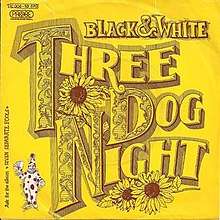Black and White (Three Dog Night song)
| "Black and White" | ||||
|---|---|---|---|---|
 | ||||
| Single by Three Dog Night | ||||
| from the album Seven Separate Fools | ||||
| B-side | "Freedom for the Stallion" | |||
| Released | August 1972 | |||
| Format | 7" 45 RPM | |||
| Genre | Pop | |||
| Length |
3:51 (album) 3:24 (single) | |||
| Label | Dunhill | |||
| Songwriter(s) | David I. Arkin, Earl Robinson | |||
| Producer(s) | Richard Podolor | |||
| Three Dog Night singles chronology | ||||
| ||||
"Black and White" is a song written in 1954 by David I. Arkin and Earl Robinson.
The most successful recording of the song was the pop version by Three Dog Night in 1972, when it reached number one on both the Billboard Hot 100 and Billboard Easy Listening charts. Billboard ranked it as the number 63 song for 1972.[1] This was one of the few hits for Three Dog Night on which Danny Hutton sang the lead vocals.
Earlier recordings
The song was first recorded by Pete Seeger in 1956, followed by Sammy Davis Jr. in 1957.[2]
The song's author Earl Robinson released his own recording in 1957, on the Folkways album A Walk in the Sun and other Songs and Ballads. (The album title refers to a song written for the 1945 film A Walk in the Sun.[3])
Reggae groups The Maytones, from Jamaica, and Greyhound, from the UK, both recorded the song in 1971, the latter achieving a UK top ten hit.[4][5]
Having heard the Greyhound version, Three Dog Night covered the song and included it on their 1972 album Seven Separate Fools.[6] Their version of the song peaked at number one on the U.S. pop chart on September 16, 1972, and topped the easy listening chart on October 7.[7] Billboard ranked it as the number 63 song for 1972.[8]
Other versions
Inner Circle recorded a cover for their 1989 album Identified.[9][10]
Meaning
The song was inspired by the United States Supreme Court decision of Brown v. Board of Education (1954), which outlawed racial segregation of public schools.
The original lyrics of the song opened with this verse, in reference to the court:
Their robes were black, Their heads were white,
The schoolhouse doors were closed so tight,
Nine judges all set down their names,
To end the years and years of shame.
However, the version of the song recorded by Greyhound, and subsequently covered by Three Dog Night, did not include this verse - making the song more universal, but also less historically specific.
Chart history
Weekly charts
|
Year-end charts
|
See also
External links
References
- ↑ Billboard Year-End Hot 100 singles of 1972
- ↑ Second Hand Songs database, Decca records 45: Sammy Davis Jr., "Songs for Americans to live by", rec. 20 Feb. 1957. This has not been reissued and is now a rare collector's item.
- ↑ Earl Robinson: A Walk in the Sun and Other Songs and Ballads Retrieved February 19, 2015
- ↑ Trojan Records box set, The Trojan Story (1972, reissued 1980)
- ↑ Black and White by Three Dog Night Songfacts
- ↑ Liner notes, Ultimate Seventies: 1972, Time Life Records.
- ↑ Whitburn, Joel (1996). The Billboard Book of Top 40 Hits, 6th Edition (Billboard Publications)
- ↑ Billboard Year-End Hot 100 singles of 1972
- ↑ "Inner Circle – Black & White". Discogs.
- ↑ "Inner Circle – Identified". Discogs.
- ↑ Kent, David (1993). Australian Chart Book 1970–1992 (doc)
|format=requires|url=(help). Australian Chart Book, St Ives, N.S.W. ISBN 0-646-11917-6. - ↑ Flavour of New Zealand, 4 December 1972
- ↑ Joel Whitburn's Top Pop Singles 1955-1990 - ISBN 0-89820-089-X
- ↑ Whitburn, Joel (1993). Top Adult Contemporary: 1961–1993. Record Research. p. 240.
- ↑ Cash Box Top 100 Singles, September 30, 1972
- ↑ Musicoutfitters.com
- ↑ Cash Box Year-End Charts: Top 100 Pop Singles, December 30, 1972